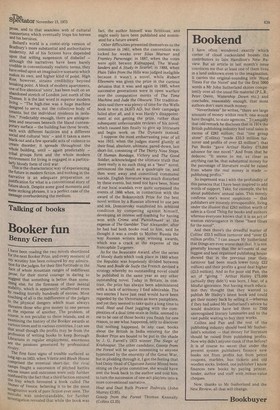Bookend
I have often wondered exactly which corner of cloud cuckooland houses the contributors to lain Hamilton's New Review. But an article in last month's issue convinces me that at least one of them lives in a land unknown even to the imagination. It carries the original-sounding title 'Hard Times For the Novel' and for the first 5000 words a Mr John Sutherland skates competently over all the usual file material (P.L.R., Peter Owen, Watership Down etc.) and concludes, reasonably enough, that most authors don't earn much money.
"Nevertheless" he writes, "there are large amounts of money within reach, one would have thought, to state agencies." To amplify that odd remark he discloses that in 1974 the British publishing industry had total sales in excess of £283 million; that "one group alone" (Collins) "made £33.5 million turnover and profits of over E3 million"; that Pan Books "gave Arthur Halley £75,000 advance for one novel." And from that he deduces: "It seems to me, as clear as anything can be, that substantial money for the patronage of literature sould be raised from where the real money is made — publishing profits."
So impressed was 1 with the profundity of this panacea that I have been inspired to add words of support. Take, for example, the bit about publishers' annual sales. This merely confirms one's worst suspicions — that publishers are innately irrresponsible, living under the illusion that £283 million worth of sales is a Good Thing for books and authors whereas everyone knows that it is an act of wanton extravagance in these "hard times for the novel".
And then there's the dreadful matter of Collins' £33.5 million turnover and "over £3 million profits." I can assure Mr Sutherland that things are even worse than that. It is not generally known that the accounts of our biggest and best organised publishing house showed that in the previous year their turnover had been much lower (only £22 million) and their profits a good deal higher (£3.5 million). And as for poor old Pan, the act of "giving " Arthur Hailey £75,000 (actually they didn't) was born, 1 fear„ of a blissful ignorance. Not having much education they thought that they wanted to publish Mr Hailey's latest book and could get their money back by selling it —whereas if they had asked Mr Sutherland's advice he would doubtless have led them to 7500 unrecognised literary luminaries and to the vast public waiting to buy their works.
Collins and Pan and the rest of the publishing industry should heed Mr Sutherland's solution — that money for literature should be raised from publishing profits. Now why didn't anyone think of that before? It is of course no secret that under the present system publishers finance new books not from profits but from petrol coupons, marbles, bus tickets and old woollen socks. Indeed, one publisher I know finances new books by paying printer, binder, author and staff with minus-value cheques.
Now, thanks to Mr Sutherland and the New Review, all that will change.
Bookbuyer


































 Previous page
Previous page